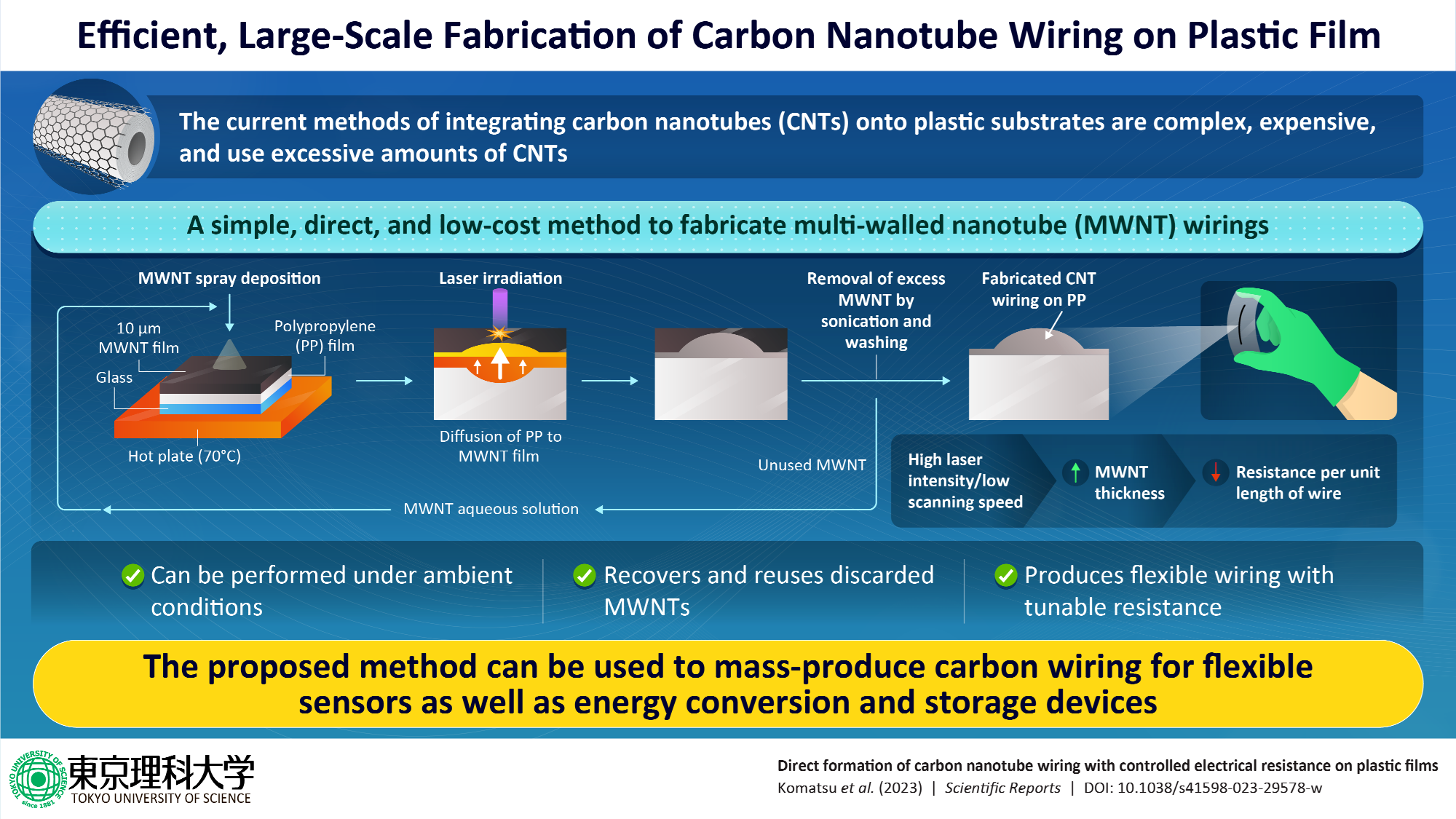Scientists at the Tokyo University of Science in Japan have devised a low-cost technique for creating multi-walled carbon nanotubes (MWNTs) on a plastic film.

Image Credit: Tokyo University of Science
The proposed methodology can be applied under ambient conditions. It reuses MWNTs and creates flexible wires with adjustable resistances without the need for additional processes. It is considered beneficial for mass-producing carbon wiring for flexible all-carbon devices as it eliminates several flaws in the current fabrication techniques.
Carbon nanotubes (CNTs) are cylinder-shaped tubes formed of carbon atoms. They exhibit several highly desired physical features, including high strength, low weight, and exceptional thermal and electrical conductivities. They are, therefore, perfect materials for a multitude of applications such as electronics, energy storage and conversion systems, and reinforcement materials.
Despite their enormous potential, CNTs have faced difficulties in the commercialization process. One such issue is how to incorporate CNTs onto plastic substrates to create flexible CNT-based devices.
Conventional manufacturing techniques need a clean facility and highly regulated settings, such as high temperatures. They also need repeated transfers to make CNTs with various resistance levels.
As alternatives, more direct techniques like thermal fusion (TF) and laser-induced forward transfer (LIFT) have been developed. In the LIFT method, CNTs are transferred directly onto substrates using a laser, but in the TF method, CNTs are mixed with polymers and then only some of them are removed using a laser to create CNT wires with different resistance values.
However, both of these approaches are expensive and come with their own set of issues. Although TF employs a lot of CNTs that are not used and are wasted, LIFT requires expensive pulsed lasers and the production of CNTs with specified resistance values.
Associate Professor Dr. Takashi Ikuno, along with his colleagues Hiroaki Komatsu, Yosuke Sugita, and Takahiro Matsunami at Tokyo University of Science, Japan, recently suggested an innovative technique that facilitates the fabrication of multi-walled CNT (MWNT) wiring on a plastic film under ambient conditions (room temperature and atmospheric pressure) using a low-cost laser. Their objective was to develop a more simple and more affordable approach.
The innovation, which was reported on February 8th, 2023 in the journal Scientific Reports, involves covering a polypropylene (PP) film with an MWNT film that is roughly 10 μm thick and then subjecting it to an mW UV laser. As a consequence, MWNT and PP are combined to create conductive wiring.
This process enables the easy ‘drawing’ of wiring and flexible devices for wearable sensors without the need for complex processes.
Dr. Takashi Ikuno, Associate Professor, Tokyo University of Science
The development of these wires, according to the researchers, was caused by the MWNT and PP film’s various thermal conductivities. Due to the strong thermal conductivity of the MWNT layer, which spreads heat along the length of the wire, the MWNT/PP film reaches high temperatures at the MWNT-PP interface and lower temperatures elsewhere in the PP film when it is exposed to the laser.
The PP diffuses into the MWNT film just below the laser, where temperatures are at their maximum, creating a thick PP/MWNT composite, while around the laser’s edges, where temperatures are lower, a thin PP/MWNT layer is created.
By simply altering the irradiation settings, the suggested approach also enables the manufacturing of carbon wires with various resistance values throughout the same process (without repeat transfer), obviating the need for extra stages.
Thicker wires with a greater MWNT concentration are created when the PP/MWNT film is exposed to high laser energy, which can be accomplished by using a high-powered laser, a high number of laser exposures, or low scanning rates.
As a result, the thicker wire and lower MWNT resistivity result in reduced resistance per unit length of the wire (resistance is directly proportional to the ratio between the resistivity and the thickness of the wire).
The researchers were able to effectively produce MWNT wires with a wide range of resistance values, from 0.789 kΩ/cm to 114 kΩ/cm, by carefully regulating the MWNT/PP film’s exposure to laser light. These wires were also quite flexible and maintained their resistance even after being bent repeatedly.
The technology also addressed a critical shortcoming of existing approaches, namely the inability of LIFT and TF procedures to reuse CNTs that were not utilized in the fabrication process.
The suggested technique enables the recovery and reuse of MWNTs that are not integrated into the PP film during laser irradiation, enabling the production of new MWNT wires with a minimal change in resistance values.
The proposed technology has the potential to implement large-scale manufacture of flexible carbon wiring for flexible sensors and energy conversion and storage devices due to its simplicity, effective use of CNTs, and ability to generate high-quality wires.
Dr. Ikuno concluded, “We expect the process cost to be significantly reduced compared to that for conventional methods. This, in turn, will contribute to the realization of low-cost flexible sensors that are expected to have wide applications in large quantities.”
Journal Reference:
Komatsu, H., et al. (2023) Direct formation of carbon nanotube wiring with controlled electrical resistance on plastic films. Scientific Reports. doi:10.1038/s41598-023-29578-w